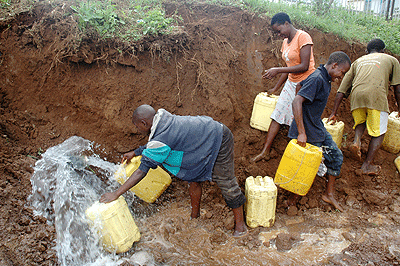As the world marks World Water Week, governments, especially in developing countries, have been called upon to come up with appropriate mechanisms to enable families have access to clean water.


As the world marks World Water Week, governments, especially in developing countries, have been called upon to come up with appropriate mechanisms to enable families have access to clean water.The European Union (EU) says that globally, drinking unsafe water claims lives of 4,000 children daily, according to a statement issued by Andris Piebalgs, the Commissioner for Development at the EU, to mark the beginning of the Water Week."Half of the hospital beds in developing countries are taken up by people suffering from diseases caused by poor water, sanitation and hygiene. This is simply unacceptable and it’s clear that more and faster progress is necessary,” the statement reads in part."We are committed to doing all we can to step up our efforts to create a world where all human beings can drink, bathe and clean with water without fearing a deadly disease from it,” the statement adds.It further highlights that access to water and sanitation is at the core of the EU’s work on reducing poverty.The development saw an extra allocation of €1 billion for African, Caribbean and Pacific (ACP) countries to help them meet the most off-track Millennium Development Goals.Speaking to The New Times, Theoneste Minani, the Director of Water and Sewage Utility at Energy Water and Sanitation Authority (EWASA), said that efforts are being made to ensure that even areas, especially in the rural areas, can get water connections."Of course there are some areas which are not covered, but we have already identified key projects to upgrade water access to those areas,” said Minani.He explained that, countrywide, EWASA is operating 25 water treatment plants with a daily production of 105,000 cubic meters.According to Minani, the water supplied meets the World Health Organization (WHO) standards and among other measures in place to ensure safe water supply in rural areas, is a mobile laboratory for water quality assessment.Access to water and sanitation is among the four Millennium Development Goals (MDGs) for which EU has earmarked €266m to promote.The ‘World Water Week’ this year is being held under the theme "Water and Food Security”.


